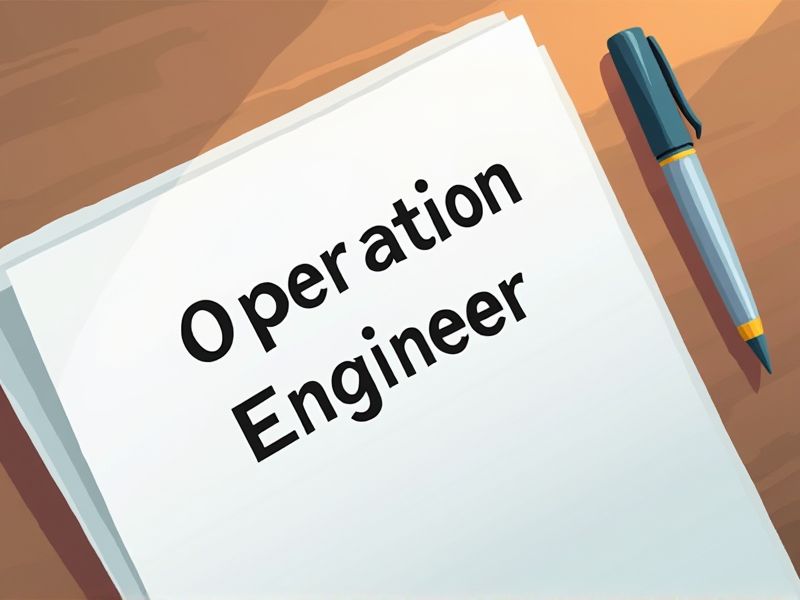
An Operations Engineer plays a crucial role in ensuring that systems and processes operate efficiently and safely. Certifications often provide validation of an engineer's skills, knowledge, and ability to meet industry standards, making them essential in this competitive field. Many employers seek certified professionals to mitigate risks and improve operational reliability. Some important certifications you may need as an Operations Engineer include those focused on safety protocols, systems management, and specific technological skills.
AWS Certified SysOps Administrator - Associate
Having an AWS Certified SysOps Administrator - Associate certification signifies a foundational understanding of AWS services, which is crucial for an Operations Engineer working with cloud infrastructure. This certification equips them with skills to implement, manage, and maintain systems running on AWS, ensuring reliability and efficiency. Operations Engineers benefit from the certification's focus on cloud security and compliance, aligning with industry best practices. The knowledge gained enhances the engineer's ability to optimize performance and cost management in a cloud environment.
AWS Certified DevOps Engineer - Professional
The AWS Certified DevOps Engineer - Professional certification equips an Operations Engineer with expertise in managing CI/CD pipelines, crucial for streamlining automated deployments. This certification emphasizes advanced skills in designing scalable infrastructures, allowing for efficient and reliable application performance in cloud environments. Understanding cloud best practices and AWS services ensures optimal resource management, reducing operational costs and enhancing system uptime. The credential demonstrates proficiency in implementing policies that foster security, compliance, and resilience within tech ecosystems.
Red Hat Certified System Administrator (RHCSA)
The RHCSA certification equips Operations Engineers with essential skills in Linux system administration, which remains a critical component of modern IT infrastructure. Employers often prefer candidates with this certification, as it demonstrates proven competence in managing and troubleshooting Red Hat Enterprise Linux environments. By obtaining the RHCSA, Operations Engineers enhance their ability to automate and streamline operations processes, leading to increased efficiency. The certification also provides engineers with access to a broader professional network and resources, fostering continuous learning and career advancement.
Certified Kubernetes Administrator (CKA)
Kubernetes has become the leading container orchestration platform, essential for efficiently deploying and managing applications at scale. An Operations Engineer with a Certified Kubernetes Administrator (CKA) credential demonstrates a validated skill set capable of managing complex Kubernetes environments. This certification enhances the ability to troubleshoot and optimize system performance, ensuring reliability and security. As organizations increasingly adopt cloud-native technologies, the demand for professionals with Kubernetes expertise continues to rise, making CKA certification a competitive advantage in the job market.
Microsoft Certified: Azure Administrator Associate
Achieving the Microsoft Certified: Azure Administrator Associate credential enhances an Operations Engineer's credibility, making them more reliable for cloud management tasks. With this certification, engineers acquire a deep understanding of Azure services, improving their ability to maintain and optimize cloud deployments. The certification also equips them with skills necessary for implementing, managing, and monitoring identity, governance, storage, compute, and virtual networks in a cloud environment. Companies benefit from certified professionals as they can ensure a secure, efficient, and cost-effective cloud infrastructure.
Google Cloud Professional Cloud Architect
A Google Cloud Professional Cloud Architect ensures robust system architecture, which directly supports the efficiency of an Operations Engineer by providing well-structured platforms. They design scalable solutions, enabling Operations Engineers to manage and optimize resources effectively. With expertise in security and compliance, they help safeguard operational integrity, reducing downtime and potential breaches. Their strategic planning capabilities allow for seamless integration and innovation, facilitating smoother operation processes.
CompTIA Linux+
CompTIA Linux+ equips Operations Engineers with essential skills to manage and troubleshoot Linux environments. The certification ensures a thorough understanding of security, automation, and scripting, which are critical in maintaining system efficiency. Companies increasingly rely on Linux for their servers and operations, heightening the demand for proficient engineers. By holding this certification, an engineer demonstrates capability and knowledge in handling complex systems, leading to enhanced productivity and reliability in operations.
VMware Certified Professional - Data Center Virtualization (VCP-DCV)
Organizations increasingly rely on virtualization technologies to enhance their IT infrastructure's efficiency, which necessitates Operations Engineers to possess VCP-DCV certification for optimal performance. The certification validates an engineer's skills in managing and deploying VMware vSphere environments, a core component in data center operations. It helps professionals reduce downtime and improve resource allocation through proven methodologies, leading to cost savings. Industry demand for certified professionals increases due to the competitive edge they provide in managing complex virtual environments.
ITIL Foundation Certification
An ITIL Foundation Certification helps an Operations Engineer understand essential IT service management principles, improving overall efficiency in managing IT services. This knowledge aligns IT services with the broader business goals, enhancing service delivery and customer satisfaction. It equips the engineer with a common language and framework, facilitating better communication within the IT team and with other departments. Having this certification can make the engineer more competitive in the job market, as many organizations prefer or require ITIL-certified professionals for operations roles.
Docker Certified Associate
Obtaining the Docker Certified Associate (DCA) certification often enhances an Operations Engineer's expertise in containerization, which is crucial for managing scalable and efficient software deployments. With a DCA certification, the engineer is likely to gain a deeper understanding of Docker's architecture and functionalities, enabling more effective troubleshooting and performance optimization. This certification frequently serves as a validation of an engineer's skill set, making them more competitive in job markets where cloud-native and DevOps practices are prevalent. Many organizations increasingly rely on container ecosystems, so being certified can frequently demonstrate a commitment to staying updated with industry standards.
Summary
When you, as an Operations Engineer, obtain relevant certifications, you can enhance your technical proficiency and industry-specific knowledge. This advanced skill set often leads to increased job opportunities and potentially higher salaries. Employers may recognize your certified expertise, resulting in greater trust and responsibility in projects. Consequently, your career trajectory may benefit from accelerated growth and advancement within the field.
